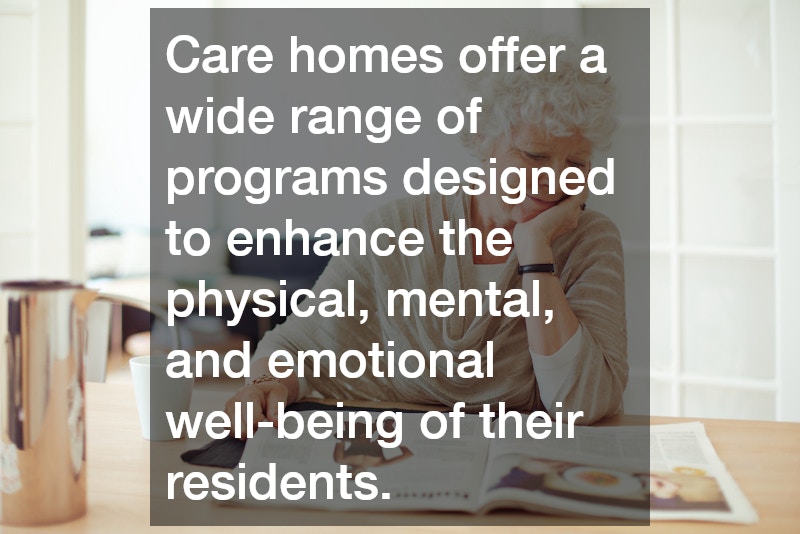Choosing the right care home for a loved one involves understanding the programs and activities they offer to ensure a fulfilling and supportive experience. Modern care homes are designed not just to provide basic assistance but to enhance the quality of life for residents through a variety of programs tailored to their needs. These programs address physical, mental, emotional, and social well-being, ensuring that your loved one feels engaged and valued.
From health and wellness initiatives to social activities, care homes offer comprehensive services that promote independence, foster connections, and provide opportunities for personal growth. Let’s explore the different programs that care homes often provide and how they can benefit your loved one.
Health and Wellness Programs
One of the primary focuses of care homes is ensuring the physical health and well-being of their residents. Many facilities offer personalized care plans tailored to each individual’s health needs. This includes regular health monitoring, medication management, and access to on-site medical professionals or visiting specialists.
Physical activity is also a key component of health and wellness programs. Care homes often organize exercise classes such as yoga, tai chi, or low-impact aerobics to help residents maintain mobility, strength, and balance. These programs are designed to be accessible for individuals with varying levels of physical ability, ensuring everyone can participate.
For residents with chronic conditions or specific health challenges, care homes may provide specialized wellness programs, including physical therapy, occupational therapy, or pain management services. These programs aim to enhance overall well-being and prevent further health complications.
Cognitive Stimulation Activities
Cognitive health is crucial for maintaining mental sharpness and preventing cognitive decline, particularly for residents with dementia or Alzheimer’s. Care homes often incorporate activities that stimulate the brain and promote cognitive engagement.
Programs like memory games, puzzles, and trivia sessions are commonly offered to help residents exercise their mental faculties. Some care homes also provide structured memory care programs that include tailored activities such as music therapy, art therapy, and sensory stimulation designed to trigger positive memories and emotions.
Additionally, educational programs, like guest lectures or book clubs, are often available to residents who enjoy learning and staying mentally active. These opportunities not only stimulate cognitive function but also foster a sense of purpose and accomplishment.
Social and Recreational Activities
Social interaction plays a vital role in maintaining emotional well-being, and care homes often create opportunities for residents to connect with others. Group activities such as movie nights, bingo games, or gardening clubs are popular ways to encourage socialization and build friendships.
Recreational activities are often tailored to residents’ interests and may include arts and crafts, cooking classes, or music performances. For those who enjoy the outdoors, care homes often organize gardening programs or nature walks, allowing residents to stay active while enjoying fresh air and sunshine.
Celebrating holidays, birthdays, and cultural events is another way care homes create a vibrant and inclusive community. These celebrations foster a sense of belonging and provide moments of joy and connection.
Nutritional and Culinary Programs
Proper nutrition is essential for maintaining health, especially for older adults or those with medical conditions. Care homes often provide meal plans designed by nutritionists to ensure residents receive balanced and flavorful meals tailored to their dietary needs.
Cooking classes or food-themed activities, such as baking or tasting events, are also popular in many care homes. These programs allow residents to engage in a fun and interactive way with their meals, providing a sense of creativity and accomplishment.
For residents with specific dietary restrictions or health concerns, care homes typically offer customized meal options and work closely with medical professionals to ensure their needs are met.
Emotional and Spiritual Support
Emotional well-being is a cornerstone of the care provided in modern care homes. Many facilities offer counseling services, support groups, or one-on-one sessions with trained staff to help residents navigate the emotional challenges of aging or living away from home.
For residents seeking spiritual fulfillment, care homes often host religious services, meditation sessions, or opportunities for quiet reflection. Chaplains or spiritual leaders may be available to provide guidance and support, fostering a sense of peace and connection.
Programs like pet therapy and music therapy are also widely used to promote emotional well-being. These activities have been shown to reduce stress, anxiety, and feelings of isolation while boosting overall happiness and relaxation.
Personalized Care Plans
A hallmark of many care homes is the emphasis on personalized care. Programs are often tailored to meet the unique needs and preferences of each resident, ensuring they receive the attention and activities that matter most to them.
Personalized care may include one-on-one fitness sessions, customized schedules for medical treatments, or tailored recreational activities that align with a resident’s hobbies or interests. This individualized approach ensures that residents feel valued and supported in their daily lives.
Family Involvement
Care homes often encourage family members to stay involved in their loved one’s care and activities. Many facilities organize family days, where relatives can participate in events or spend quality time together. Open communication with staff also ensures that families are informed about their loved one’s progress and any changes in care needs.
Family involvement strengthens bonds and helps create a supportive environment for residents, making their transition to a care home smoother and more positive.
Care homes offer a wide range of programs designed to enhance the physical, mental, and emotional well-being of their residents. From health and wellness initiatives to social and recreational activities, these programs aim to create a fulfilling and nurturing environment where your loved one can thrive.
By choosing a care home with diverse and thoughtfully designed programs, you can ensure that your loved one receives not only the care they need but also the opportunity to enjoy life, build connections, and explore their interests. Understanding the offerings of a care home will help you make the best choice for your loved one’s unique needs, ensuring their comfort, happiness, and overall quality of life.
.


